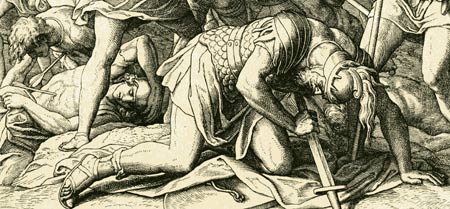 “Your Bible is full of contradictions…”
“Your Bible is full of contradictions…”
As a good Bible-believing Christian you hear such a statement and balk. And then in the quiet of your bedroom you stumble upon a few of these “contradictions”. As a bit of shame fills your heart, you begin to wonder if maybe those who deny the Bible might have a point.
After all, this is a pretty obvious contradiction. You’d think an omniscient God would have caught such a discrepancy. But there it is in 1 and 2 Samuel.
1 Samuel ends with the death of Saul who “took his own sword and fell upon it” (1 Samuel 31:4). Suicide. Rather than be shamed and tortured by the Philistines, Saul took his own life.
2 Samuel begins with an Amalekite telling David the sad news of the demise of Israel’s king. But his story is a bit different. Rather than suicide the Amalekite says that he “stood beside him and killed him, because I was sure that he could not live after he had fallen” (2 Samuel 1:10). So in this version it wasn’t suicide, it was a mercy killing. Saul didn’t fall on his own sword as 1 Samuel says, he was killed by an Amalekite.
It cannot be both.
Now before I attempt to unravel this supposed mess, let me give you a couple of principles for dealing with these contradictions.
Principle #1: The Jews Weren’t Idiots
The author of 1 and 2 Samuel is the same person. He’d be a really terrible author to miss such a contradiction. Even if you take the more liberal route and believe that these two histories were written by a group of editors, you’d have to admit that somebody is an idiot to let such a glaring contradiction go unedited.
The Jewish people considered this to be God’s Word. And as such they viewed it as accurate—without error. In order to take the position that this is a glaring contradiction that disproves the Bible we’ve got to be willing to do a couple things.
First, we have to believe that for hundreds of years people just flat out missed this error, or we have to believe that they knew about it and just didn’t care.
If we go for the second option, we have to believe that these same people (or those they discipled) taught that the Bible was God-inspired, all the while knowing full well that they had an obvious contradiction in the text.
In order to perpetuate such a myth they would have to change the text. Unless of course you believe that people were too stupid to call bull on a blatant contradiction. But they didn’t change the text. They kept it how it reads today. And so we are only really left with one conclusion…
There isn’t a contradiction in the text. Which leads to our second principle.
Principle #2 You Don’t Know Everything
Or to put that another way, just because it seems like a contradiction to you it does not mean that it is necessarily so. It is possible that you are lacking in understanding on a key point somewhere along the way which makes you think something is a contradiction. But truth but told the dissonance isn’t in the text, it is in your understanding of the text.
This reminds me of the man and his son who are in a terrible car wreck. The father dies and the son is about to join him—the only thing that will save his life is a risky operation. But when they put the boy into the operating room the doctor says, “I can’t operate on this boy…he’s my son”.
Many people are baffled by this because they are assuming that the doctor must be a man—and hence the boy’s father. But the doctor is his mother. No contradiction. It just seems that way.
The Death of Saul
That same type of thing is happening in our little conundrum with Saul. Keep in mind that 1 and 2 Samuel were originally one book. And so the original audience would have read the end of our 1 Samuel and the beginning of 2 Samuel within a very short span of time.
Doing so, they likely would have picked up on the character of this Amalekite. The narrator—who we’d assume is being truthful—has just told us about Saul’s fate. But then this Amalekite comes in and tells David another story. The audience would be in on the fact that this guy is lying in order to gain favor with David. He’s trying to pretend like he did something noble. But his lie cost him his life.
The whole point of this—and the reason for bringing the Amalekite into the story is to once again reiterate that David is above reproach in ascending to the throne in the place of Saul. He did not take the throne by force—but it was ripped from Saul by the Lord. This little scene at the beginning of 2 Samuel further reiterates that point.
Saul killed himself. The Amalekite was a liar. No contradiction.
—
Photo source: here